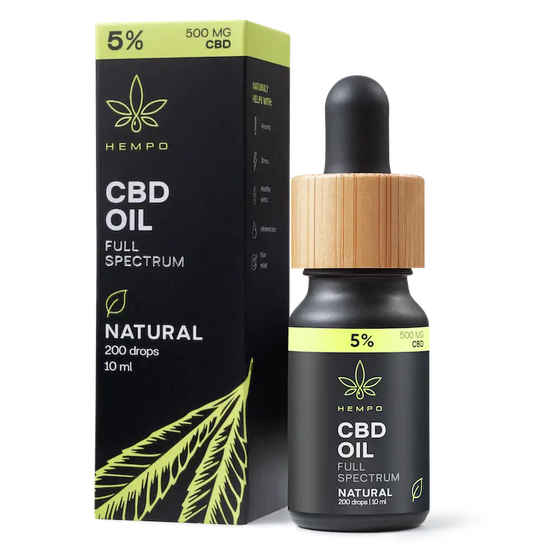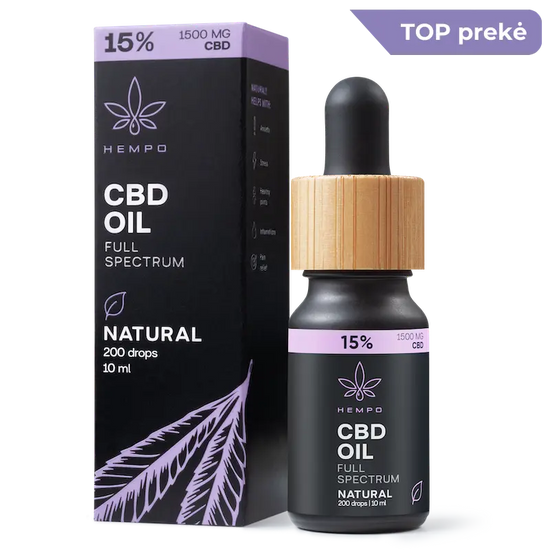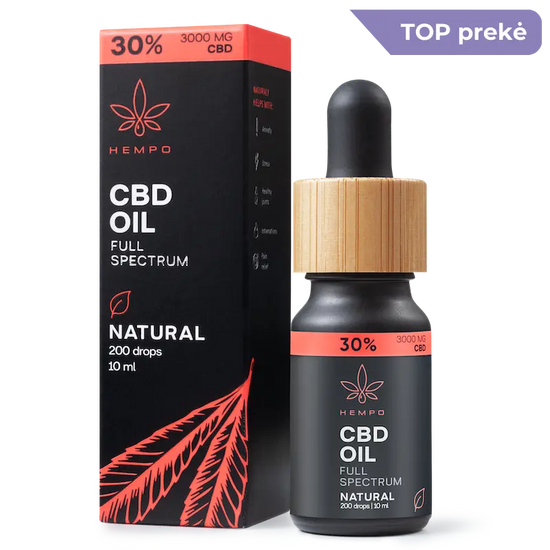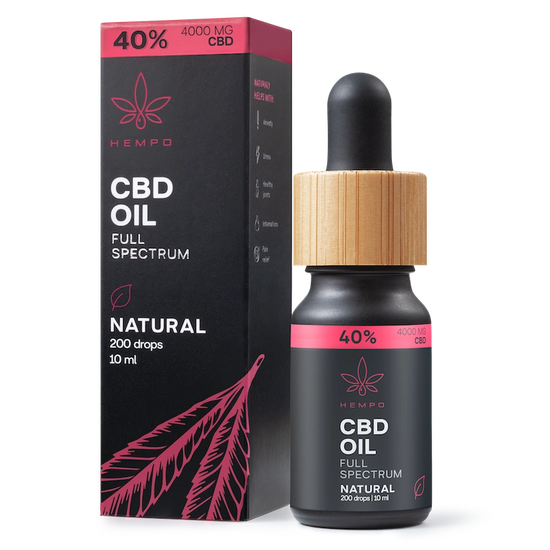What is CBD?
CBD (cannabidiol) is one of over 100 different cannabinoids found in hemp plants, first discovered in 1940. Along with THC, CBD makes up about 40% of the total extract of the cannabis plant. Unlike THC, CBD does not have psychoactive effects. CBD mimics the brain's neurotransmitters by acting on the body's endocannabinoid system, making it highly beneficial for our health and well-being.
The article discusses what CBD is and provides a brief history, presents evidence of how CBD works, and explores its effects on the human body. It also covers the interaction between CBD and THC, as well as the various ways CBD can be used. Table of Contents
Note: This and other articles on Hempo's blog are for informational purposes only. According to the directive of the European Commission, cannabidiol is classified as a 'novel food', therefore CBD products should not be used as a food supplement in Lithuania.
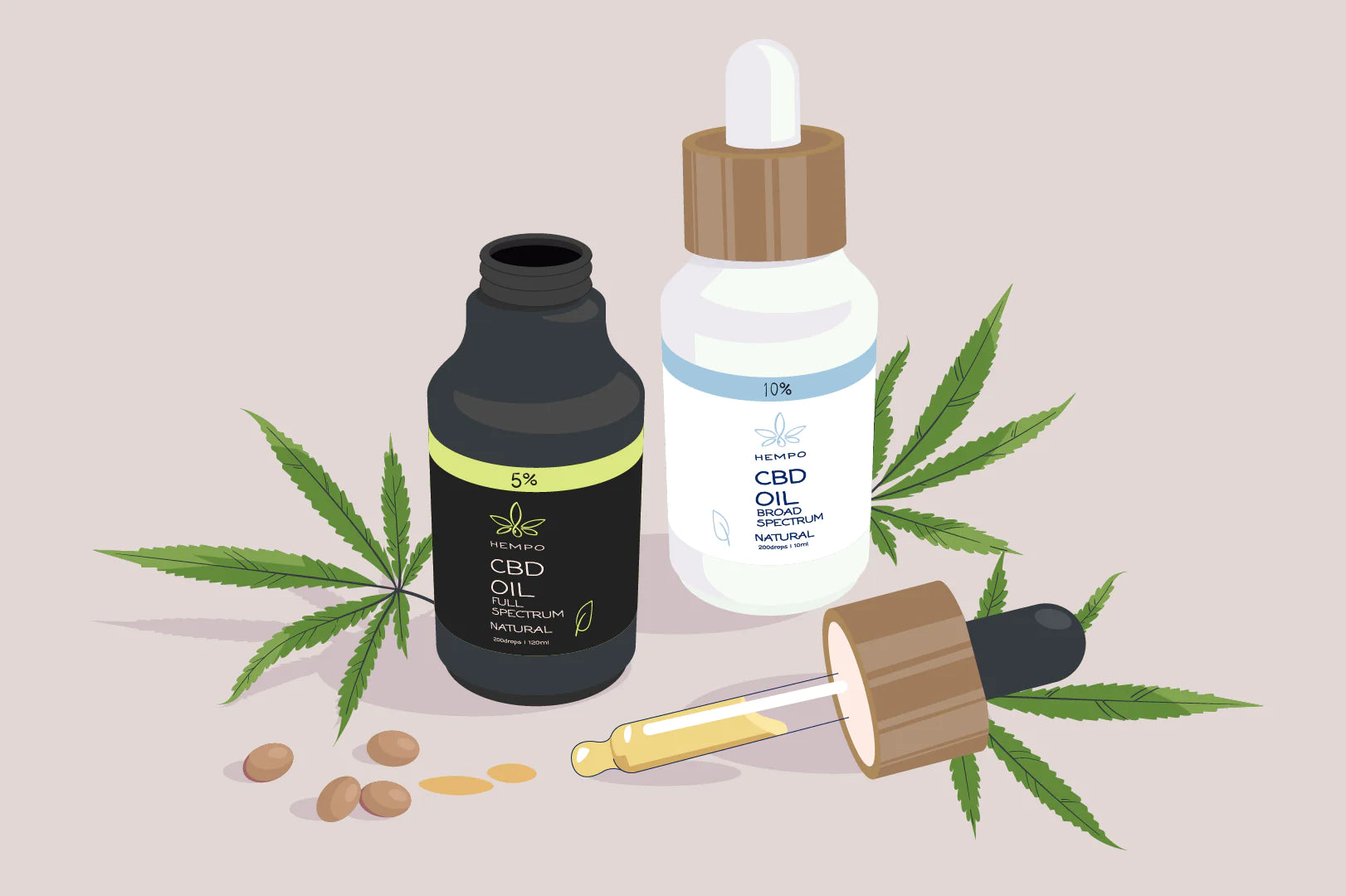
Many would probably agree that lately we have been seeing and hearing the name CBD almost everywhere, from social media to TV commercials. And yet, despite how well-known it is becoming, many people still don't know the essential information about this compound. Lucky for you, we are here to help you untangle the seemingly complicated world of CBD and answer the question "What is CBD?".
What is CBD? A brief prehistory
CBD is classified as a cannabinoid, a compound that acts similarly to neurotransmitters in your brain. Cannabinoids are naturally found in the human body, but when they are produced by your body, they are called endocannabinoids.
After the law came into effect in Lithuania, allowing the use of all parts of the hemp plant in production, many brands and consumers very quickly began to realise the unique nature and effect of CBD. In many foreign countries, CBD is especially popular due to its anti-inflammatory, anxiety-relieving and calming effects. CBD cosmetics has also become very popular in Lithuania, helping many people to deal with problems such as joint pain (and other pains), dry skin, breakage of nails and hair.
What are Cannabinoids?
Cannabinoids are natural compounds found in hemp (Cannabis sativa). Although there are over 480 different chemical substances in hemp plants, it is known that about 113 of them can be classified as cannabinoids.
Cannabinoids are divided into the following main groups:
- Cannabigerols (CBG)
- Cannabichromenes (CBC)
- Cannabidiol (CBD)
- Tetrahydrocannabinol ( THC)
- Cannabinol (CBN)
- Cannabinodiol (CBDL)
- There are also other types of cannabinoids, such as cannabicyclol (CBL), cannabielsoin (CBE), and cannabitriol (CBT).
The primary differences between cannabinoids are due to their varying properties. For instance, CBD, CBG, and CBC do not cause psychoactive effects, whereas THC has psychoactive properties, i.e., it can cause a feeling of intoxication. One of the main reasons why the cannabinoid CBD has become so popular worldwide in recent years is that, unlike THC, it has immense potential for health benefits, such as reducing anxiety and stress, improving sleep quality, boosting the immune system, having anti-inflammatory and antioxidant properties, and not being psychoactive.
The mechanism of action of cannabinoids is well described by their interaction with specific receptors in the human body, located on the surface of cells. These receptors are distributed throughout various parts of the central nervous system, with the main types being CB1 and CB2 receptors. Anandamide, a naturally occurring substance in the brain discovered by scientists in 1992, activates CB1 receptors, along with other similar compounds identified later and known as endocannabinoids.
Evidence that CBD works
The rapidly growing interest of people in CBD, the ever-increasing number of ads and positive reviews can pique the curiosity of many. With the growing interest in cannabidiol, for those new to the benefits of CBD, a natural question may arise: Do CBD products provide tangible benefits?
When looking for an answer, it is worth noting that there are many scientific studies that have proven the effectiveness of CBD in dealing with various problems. A study conducted in 2019 found that CBD in cosmetic products helped to relieve skin dryness, itching and general facial skin irritation.
Another study found that CBD use was an effective therapeutic product in the treatment of chronic inflammation and sciatic nerve pain. Additional studies have shown that the subjects who were exposed to anxiety-provoking situations experienced a decrease in anxiety symptoms . Cannabidiol is believed to improve the quality of sleep and adjust the sleep rhythm.
CBD can also be effective in relieving joint pain and headaches. This product is recommended for people with various chronic conditions like Parkinson's, arthritis, etc.
How does CBD affect your body?
After making sure that cannabidiol is effective, another question arises. How does this compound interact in your body?
There is no shortage of complex scientific studies on this issue, but we can provide a fairly simple and straightforward answer. Cannabidiol positively affects the endocannabinoid system (ECS) in everyone's body (ECS) .
The endocannabinoid system is a natural biological system that is very important in regulating multiple functions, such as appetite, mood, sleep rhythm, skin PH, nail and hair structure balance, immune system, pain perception, etc. The ECS contains endocannabinoid receptors, whose essential function is to transmit impulses to your brain: the receptors tell you when to feel and not to feel pain, anxiety, hunger and sleepiness.
It is these receptors that CBD acts on.
What is the Endocannabinoid System (ECS)?
Understanding the endocannabinoid system (ECS) is crucial for those delving into the complex processes of human biology. The ECS is a complex cell signaling system in the human body discovered by scientists in the early 1990s while researching the well-known cannabinoid THC. The ECS plays a vital role in regulating various bodily functions and processes, including mood, sleep, appetite, immune system response, circulation, and memory. The endocannabinoid system is essential for maintaining proper homeostasis in the body. In other words, the ECS helps ensure that the internal environment of the body remains stable despite external environmental changes.
The main components of the endocannabinoid system are endocannabinoids, receptors, and enzymes that help maintain optimal ECS function. Endocannabinoids are naturally produced molecules in our body similar to cannabinoids found in cannabis. These endocannabinoids bind to receptors in the nervous system and ensure the proper functioning of the ECS.

CBD bioavailability and routes of administration
If you are interested in what CBD is and how it can benefit your health and well-being, it is important to analyze the concept of CBD bioavailability and the different ways it can be used. Simply put, bioavailability is the rate at which CBD (cannabidiol) enters your bloodstream. In a study published in the journal Frontiers in Pharmacology, researchers found that the highest bioavailability is achieved when CBD is mixed with MCT coconut oil compared to other carrier oils such as hemp seed or olive oil. In countries where CBD is used as a dietary supplement, the most effective way of administration is by dropping the oil under the tongue, in this way the maximum and fastest absorption of the active substances is achieved. Another alternative to using CBD oil is external use, in this case the hemp extract can be rubbed on the arteries of the wrists (hands), sore muscles/joints, or problematic areas of the skin (rash, acne). Understanding bioavailability can greatly increase the effectiveness of hemp extract. So whether you're using CBD oil for the first time or looking to improve its effectiveness, remember that not all CBD products are equally effective.
How to use CBD
- In foreign countries, CBD oil is usually taken orally: a few drops can be put directly in the mouth or mixed in a glass of water, added to other drinks or food. Please note that it may take 1 to 2 hours for the oil to work this way as it has to pass through the digestive system. Do not exceed the recommended dose of cannabidiol, and use the lowest recommended dose when using this product for the first time.
- CBD oil can also be used topically. It works best in cases where a local effect is aimed at relieving pain in a specific area of the body (e.g. joints). For first-time CBD users, we recommend putting one drop on the palm of your hand, rubbing it and making sure that you do not experience an unwanted allergic reaction (redness of the skin, etc.).
Different CBD Products
When it comes to the different uses of CBD, we can find a variety of products on the market to suit different needs and preferences. For those asking, "What is CBD?" it is important to know that CBD oil is only the tip of the iceberg.
CBD cosmetics are gaining popularity due to their benefits in the fight against various skin problems, rashes, dry skin or excessive oiliness, as cannabidiol can balance the secretion of skin glands (sebum).
CBD gummies are a convenient, quick and tasty way to consume cannabidiol. However, studies have shown that the digestive acids in the stomach destroy up to 23% of cannabidiol, so this method of administration may not be as effective.
CBD patches provide a slow release of CBD into the subcutaneous layer and muscles, which can provide pain relief.
Smoking CBD liquid offers an alternative way to consume CBD - vaping, which often provides a quick sense of relaxation. However, it is worth noting that there are not enough clinical studies to confirm the safety of inhaling CBD oil.
Each of these products allows users to try different ways of consuming CBD and the benefits that best suit their needs.
Potential side effects of CBD
Although CBD side effects are very rare, it is important to be aware that symptoms such as dry mouth, diarrhea, changes in appetite, short-term dizziness or fatigue may occur. To reduce the risk of experiencing these effects, choose the highest quality CBD oil on the market. Always check CBD oil laboratory results to make sure the product is free of heavy metals and other contaminants (this information is provided by each certified lab). By doing so, you will not only increase the effectiveness of the product, but also reduce the likelihood of possible side effects.
CBD dosing
In order to achieve the desired result, it is very important to understand about CBD dosage. Contrary to popular belief, it is not the concentration of CBD oil that matters, but the amount of CBD consumed in milligrams. Whether you use a small (eg. 5%) or high strength (30%) oils, the main criterion is the total CBD content in milligrams. For first-time users of hemp oil, the general recommendation is to start with 30mg of CBD twice a day. If you decide you want a stronger effect, you can gradually increase the number of drops until you feel the desired results.
CBD and drug interactions
One important detail that is often overlooked is how CBD can interact with certain medications you may already be taking, such as blood thinners. This can be a very important consideration for those taking medication, as interactions can affect the effectiveness of the medication and cause unwanted side effects. If you are on medication, especially blood thinners, be sure to consult a healthcare professional before incorporating CBD into your daily routine, as this can help ensure your safety and the effectiveness of your medication and CBD.
Can you take CBD with THC?
CBD is the second most common active ingredient derived from the hemp plant, the first being tetrahydrocannabinol (THC). Although CBD and THC are closely related as they are both cannabinoids, their effects are very different.
THC has psychoactive effects, leading to anxiety or paranoia. Unlike THC, CBD does not have psychoactive effects or other negative effects. Cannabidiol products will not make you feel intoxicated, irritated or nervous and you will not experience hallucinations or other unpleasant sensations. To learn more, read the article "Is CBD legal in Lithuania ?".
When it comes to the interaction between CBD and THC, it is worth noting that very small amounts of THC can be found in full-spectrum CBD oil. It has the widest range of ingredients compared to other CBD oils. It contains cannabinoids such as CBD, CBG, CBN, etc., as well as terpenes, flavonoids and other natural compounds found in the hemp plant. This oil has the strongest effect and is therefore highly valued.
Important to mention that laws of the Republic of Lithuania establish that the THC content in full-spectrum CBD oil and all other hemp products cannot exceed 0.2%. Therefore, you should choose brands that provide analyses of laboratory tests for each batch and detailed information on the content of all cannabinoids in these products.
Although it is very unlikely that your body will absorb a detectable amount of THC through the skin, if you are a professional athlete, have a job where you are subject to periodic drug tests, are pregnant, breastfeed or are simply afraid of THC substances, it is recommended to choose THC-free broad-spectrum CBD oils .

CBD benefits for animals
Animals, like humans, have an Endocannabinoid System (ECS), so CBD oil can provide them with positive health and well-being benefits. CBD oil is very popular among pet owners in the US, especially loved for its effects on reducing dog aggression, anxiety (eg. fear of fireworks), and joint pains. In addition, CBD effectively improves the well-being of cats - it relieves age-related joint pain, improves digestion and also reduces nervousness. When choosing a CBD product for your pet, it is very important to choose an oil that does not contain the substance THC, as it is dangerous to animals. In this case, it is best to choose a broad-spectrum CBD oil specially adapted for pets. Regardless of your choice, consult your veterinarian before using CBD.
Important criteria for growing hemp
The process of growing high-quality hemp is an important factor that affects the amount of beneficial cannabinoids, terpenes and flavonoids in the hemp plant and the effectiveness of CBD oil. In order to maximize the amount of these valuable compounds, it is necessary to choose a hemp extract that is extracted from species of hemp with a special genetic profile. But it's not just how much beneficial cannabinoids a plant produces that matters, but also how it's grown. It is advisable to avoid products that are made from hemp grown using pesticides and chemical fertilizers, as this affects the quality, safety and benefits of CBD. Look for producers who choose natural pest control and sustainable farming methods, such as crop rotation and organic soil enrichment. These methods not only result in a more efficient and cleaner product, but also contribute to a more sustainable and green agricultural model.
Is CBD Legal in Lithuania?
If you are considering not only what CBD is but also the specifics of its legality in Lithuania, it's time to discuss it. Due to its non-psychoactive nature and universal health benefits, CBD is valued by many, and the legal status of CBD products in Lithuania depends on the Hemp Law enacted in the country in 2021. This law allows the use of all parts of the hemp plant in Lithuania, influenced significantly by the new European Commission regulations. The law also specifies which parts of the hemp plant (e.g., seeds, flowers, stems) can be processed and which hemp varieties (Cannabis sativa L. with THC levels not exceeding 0.2%) can be cultivated.
Thus, to answer whether CBD is legal in Lithuania, it is worth mentioning that CBD derived from hemp with THC levels not exceeding 0.2% is considered legal. This aligns with standards in many other European countries. Every consumer has the opportunity to check whether the minimal THC content in their purchased CBD product indeed does not exceed the allowable limit - just thoroughly review the third-party laboratory test results provided by the manufacturer. This ensures not only the legality of CBD products but also their safety.
As easy as C-B-D!
As you can see, to understand what CBD is, it is not enough to know what it means. It is very important to find out how this cannabinoid works and what it does.
The three letters of CBD hide a whole wide range of possibilities that you need to discover for yourself. Cannabidiol is definitely worth a try: it is well tolerated in almost all cases and side effects are very rare.
We hope that we have been able to dispel some of the questions surrounding CBD, including "what is CBD?".


